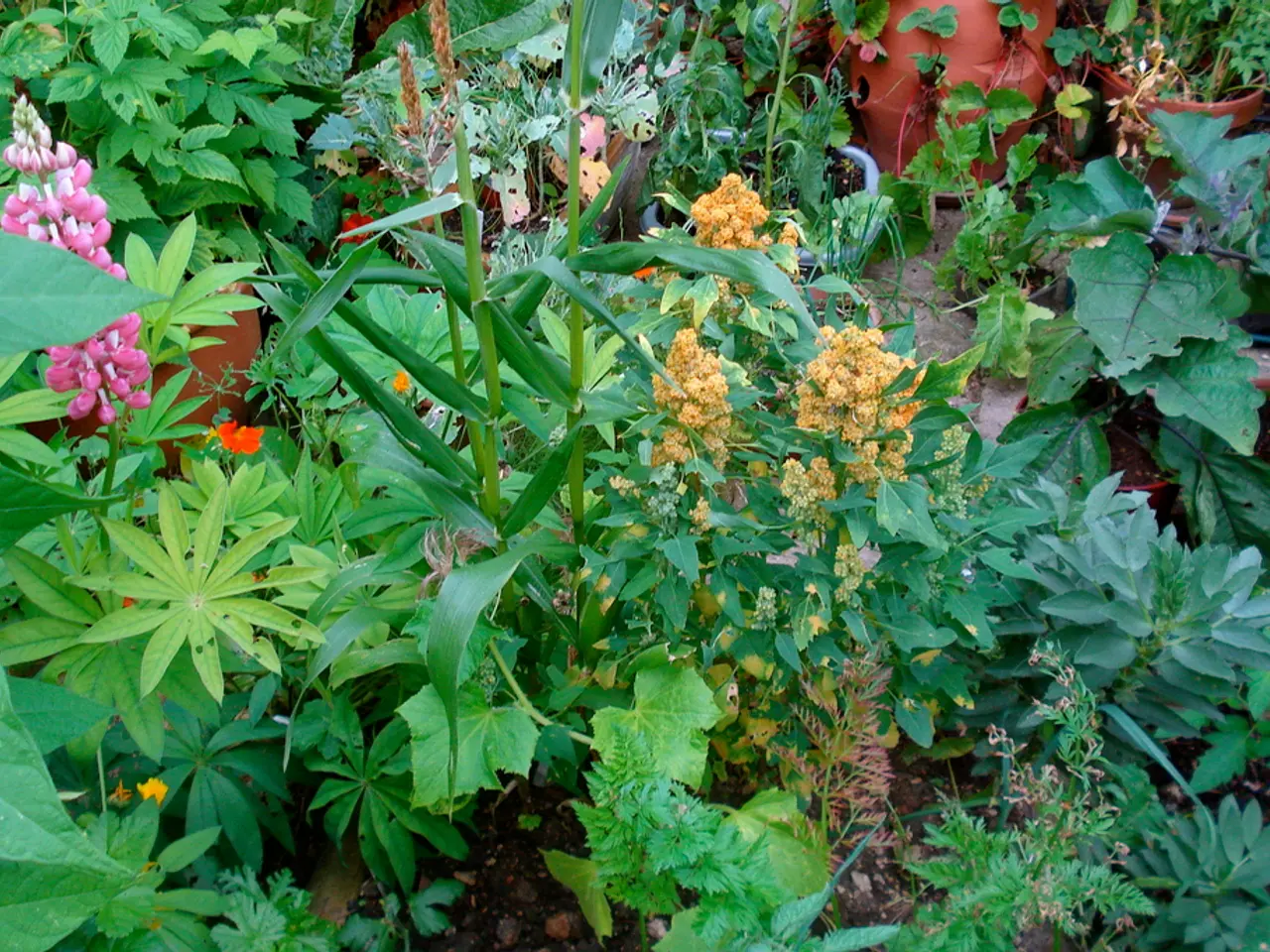Urgent Call to Preserve Medicinal Herbs by National Medicinal Plants Board Chief: Future at Stake Otherwise
The Indian government, through the National Medicinal Plants Board (NMPB) under the Ministry of AYUSH, has announced plans to establish medicinal plant gardens in 700 schools across the country[1][2][4][5]. This initiative is part of broader programs like "Poshan Vatika," aimed at enhancing nutrition security and promoting sustainable health and environmental awareness among students.
Key details include:
- The NMPB actively promotes School Herbal Gardens as grassroots projects to raise awareness about medicinal plants, integrate traditional health knowledge, and support sustainable livelihoods through cultivation[5].
- These gardens will serve educational and nutritional purposes, aligning with national goals such as the United Nations Sustainable Development Goals (SDGs 2, 3, 13, and 15) related to zero hunger, good health, climate action, and biodiversity preservation[1].
- The initiative builds on successful community-driven models like the "Eden of Elixirs," encouraging replication in schools and community centers nationwide[1][4].
- Complementary schemes include distributing high-quality planting material to local farmers and rural communities to promote medicinal plant cultivation, especially in marginal and waterlogged areas[1].
- The program is part of a comprehensive approach involving conservation agreements, awareness campaigns, and integration of medicinal plants into mainstream healthcare[5].
The Medicinal Garden 'Eden of Elixirs,' inaugurated at Manav Rachna International Institute of Research and Studies (MRIIRS), is a prime example of this initiative[6]. The garden features over 130 species of medicinal and aromatic plants, including Ashwagandha, Brahmi, different varieties of Tulsi, Gudmar, Giloy, Vach, and more[7].
Dr. Nidhi Didwania, Director of MRCMPP and Principal Investigator of the project, emphasized the educational significance of the garden[8]. Every vegetable and fruit consumed has medicinal value, and failure to conserve medicinal plants may compromise health and nutrition in the future.
'Eden of Elixirs' is a living lab where students, researchers, and communities connect with nature, explore bioactive compounds, and contribute to the global conversation on sustainable healthcare[9]. The garden is designed in the shape of a flower with eight petals, each systematically representing different systems of the human body such as oral health, digestive health, and cancer care[7].
The event marked the launch of "A Comprehensive Book on Medicinal Plants," edited by Dr. Nidhi Didwania and Dr. Jeetendra Kumar[10]. Dr. Mahesh Kumar Dadhich, CEO of the National Medicinal Plants Board (NMPB), reiterated the urgency of conservation and the need for community participation to safeguard medicinal plants[11].
The garden is significant for community participation in the conservation of vital natural resources for future generations. The center of the garden houses a pond with a Blue Water Lily (Neel Kamal), enhancing its aesthetic appeal and biodiversity[7].
Dr. Dadhich advocated for the replication of community-driven initiatives like the Eden of Elixirs in schools and community centers nationwide[12]. As the government moves forward with its plans, these gardens promise to be vital resources for health education, nutrition security, and sustainable livelihoods.
[1] https://www.pib.gov.in/PressReleasePage.aspx?PRID=1677549 [2] https://www.newindianexpress.com/states/haryana/2021/mar/29/mrcmpp-to-establish-700-school-herbal-gardens-across-haryana-2296943.html [3] https://www.business-standard.com/article/pti-stories/national-medicinal-plants-board-supports-establishment-of-medicinal-garden-eden-of-elixirs-by-mrcmpp-121032600157_1.html [4] https://www.downtoearth.org.in/news/health/haryana-to-have-700-school-herbal-gardens-to-promote-medicinal-plants-78985 [5] https://www.thehindu.com/news/national/other-states/herbal-gardens-in-700-schools-under-government-initiatives/article34057896.ece [6] https://www.mriirs.edu.in/mriirs/news/medicinal-garden-eden-of-elixirs-inaugurated-at-mriirs [7] https://www.mriirs.edu.in/mriirs/medicinal-garden-eden-of-elixirs-inaugurated-at-mriirs [8] https://www.mriirs.edu.in/mriirs/medicinal-garden-eden-of-elixirs-inaugurated-at-mriirs [9] https://www.mriirs.edu.in/mriirs/medicinal-garden-eden-of-elixirs-inaugurated-at-mriirs [10] https://www.mriirs.edu.in/mriirs/medicinal-garden-eden-of-elixirs-inaugurated-at-mriirs [11] https://www.mriirs.edu.in/mriirs/medicinal-garden-eden-of-elixirs-inaugurated-at-mriirs [12] https://www.mriirs.edu.in/mriirs/medicinal-garden-eden-of-elixirs-inaugurated-at-mriirs
- The Medicinal Garden 'Eden of Elixirs', serving as an educational hub for health-and-wellness, is a prime example of the Indian government's initiative to establish medicinal plant gardens in schools, which integrates traditional health knowledge with sustainable environmental-science and nutrition goals.
- By aligning with national goals such as the United Nations Sustainable Development Goals (SDGs 2, 3, 13, and 15) and building on successful community-driven models like the "Eden of Elixirs", these gardens will contribute to the global conversation on sustainable healthcare and biodiversity preservation, while simultaneously promoting science education and sustainable livelihoods.
- As the NMPB encourages the replication of community-driven initiatives in schools and community centers nationwide, the medicinal plant gardens promise to serve as vital resources for environmental-science education, health, and nutritional security.








